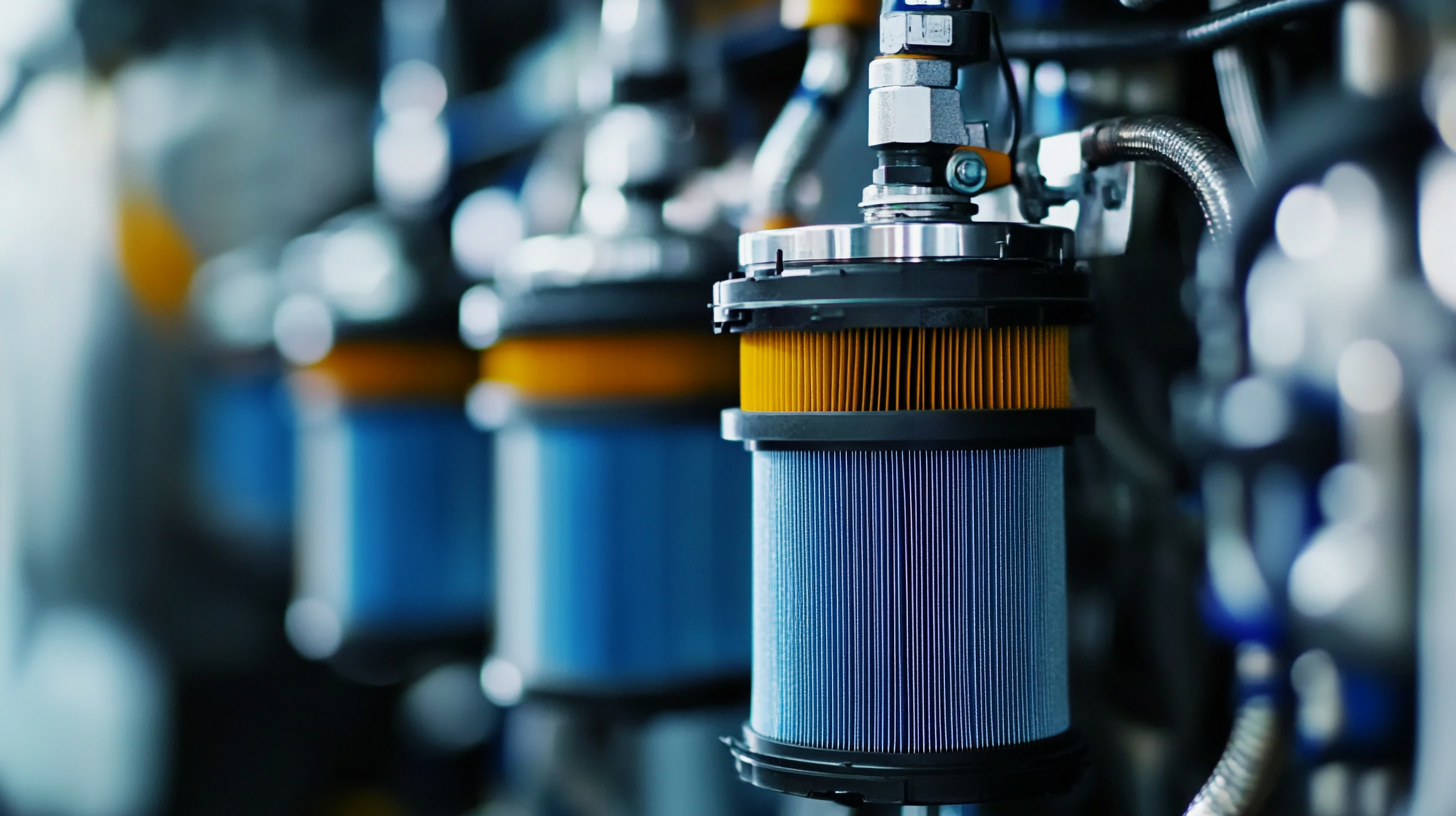
Navigating the 2025 Trends in Best Oil Filters and How to Choose the Right One
As the automotive industry continues to evolve, understanding the latest trends in oil filters becomes essential for both car enthusiasts and everyday drivers. According to a report from Grand View Research, the global oil filter market was valued at over $3.5 billion in 2021 and is projected to grow at a CAGR of 5.1% from 2022 to 2030. This growth is fueled by increasing consumer awareness regarding vehicle maintenance and innovative advancements in filter technology. As we navigate the trends of 2025, it is crucial to analyze not only the types of oil filters available but also the selection criteria that can influence engine performance and longevity. By being informed about the best oil filters in the market, consumers can make educated choices that ultimately lead to better efficiency and cost savings.

Current Industry Standards for Oil Filters: A Comprehensive Overview
When selecting the best oil filters in 2025, understanding current industry standards is pivotal. According to a recent report by the American Petroleum Institute (API), the filtration efficiency of oil filters has improved significantly, with many filters now achieving a minimum efficiency rating of 95% for particles as small as 20 microns. This high standard is crucial, as contaminants at this size can cause significant engine wear over time. With over 40% of engine failures attributed to oil degradation, using a top-tier oil filter is not just advantageous; it’s essential for maintaining vehicle longevity.
Furthermore, the trend towards synthetic oil is influencing oil filter design. A study conducted by the Society of Automotive Engineers (SAE) indicates that oil filters paired with synthetic oils can last up to twice as long, reducing the need for frequent changes. This alignment with synthetic oils highlights a push for greater durability and filtration technology, including advanced materials like synthetic media that enhance particle capture without compromising oil flow. As consumers become more environmentally conscious, the move towards manufacturing recyclable and eco-friendly oil filter options is also gaining traction, though it's essential for buyers to ensure these alternatives meet the robust performance standards set by organizations such as the API and the International Organization for Standardization (ISO).
Navigating the 2025 Trends in Best Oil Filters
Key Features to Look for in a High-Quality Oil Filter
When selecting a high-quality oil filter, it’s essential to focus on several key features that can significantly impact engine performance and longevity. One of the primary factors to consider is the filter's filtration efficiency. Look for filters that can trap smaller particles, ideally down to 20 microns or smaller, as this ensures that harmful contaminants are effectively removed from the oil. High-quality filters often utilize advanced filtration media, such as synthetic fibers or pleated designs, which enhance dirt-holding capacity and improve oil flow.
Another critical feature is the filter's build quality and durability. A well-constructed oil filter should have a robust canister made from high-quality materials that can withstand engine pressures and temperature fluctuations. It's also vital to examine the seal and bypass valve; a properly designed seal prevents leaks, while an efficient bypass valve ensures that oil flow remains optimal even in extreme conditions. Lastly, consider the manufacturer's reputation and warranty, as these can be indicators of the filter's reliability and overall performance. Investing time in understanding these features will help you choose the right oil filter for your vehicle, ensuring smoother operation and extended engine life.
Navigating the 2025 Trends in Best Oil Filters and How to Choose the Right One - Key Features to Look for in a High-Quality Oil Filter
| Feature | Description | Benefits | Recommended Specifications |
|---|---|---|---|
| Filtering Efficiency | Percentage of contaminants filtered out of the oil. | Improves engine cleanliness and longevity. | >95% filtration rate. |
| Filter Material | Type of material used for filtering, such as cellulose or synthetic. | Durability and resistance to high temperatures. | Synthetic blend for high performance. |
| Flow Rate | Amount of oil that can flow through the filter. | Maintains oil circulation for optimal engine performance. | Optimized flow that meets OEM specifications. |
| Bypass Valve | Allows oil to bypass the filter if it gets clogged. | Prevents engine damage by ensuring oil flow. | Integrated with spring tension for reliability. |
| Capacity | Amount of dirt and contaminants the filter can hold. | Extends maintenance intervals, reducing frequency of oil changes. | High dirt-holding capacity (e.g., >10 grams). |
Understanding the Types of Oil Filters: Pros and Cons
When it comes to selecting the right oil filter for your vehicle, understanding the different types is essential. The two main categories of oil filters are mechanical (or traditional) filters and synthetic filters. Mechanical filters utilize a paper medium to trap contaminants as oil flows through, making them a cost-effective option. However, they may not filter out the smallest particles as effectively as other types. On the other hand, synthetic filters, made from advanced materials, provide superior filtration and durability but often come at a higher price point.
When choosing an oil filter, consider the pros and cons of each type. For instance, mechanical filters are widely available and usually cheaper, which can appeal to budget-conscious consumers. Yet, if you prioritize engine performance and longevity, investing in a synthetic filter may yield benefits that are worth the extra expense.
**Tips:** Always check your vehicle's manual for the manufacturer-recommended filter type. Also, consider changing your oil filter regularly, ideally with every oil change, to maintain optimal engine health. Lastly, researching reputable brands can save you from low-quality filters that can compromise your engine's performance.
Market Trends for Oil Filters in 2025: Data-Driven Insights
As we look ahead to 2025, the oil filter market is poised for significant evolution, influenced by various industry trends and data-driven insights. According to recent market analysis, the demand for high-efficiency filters is expected to rise dramatically, paralleling advancements in engine technology and increased awareness of environmental standards. With manufacturers prioritizing investments in digital infrastructures, this evolution is anticipated to bolster innovation and improve product performance across the board.
The introduction of advanced materials and designs in oil filters is expected to enhance filtration efficiency, thus extending engine life and improving vehicle performance. Furthermore, the prevalence of smart technology integration, such as sensors that provide real-time monitoring of filter condition, is set to reshape customer expectations and drive market growth. This shift aligns with broader trends observed in various sectors, including hydraulic filters, indicating a robust trajectory for data-driven solutions in the manufacturing industry. As the focus on sustainability and efficiency continues to dominate, industry stakeholders must remain agile and informed to effectively navigate these changing dynamics and offer products that meet emerging market demands.

Expert Recommendations: Choosing the Right Oil Filter for Your Vehicle
When selecting the right oil filter for your vehicle, it's essential to understand the specific needs of your engine. Different vehicles have varying requirements based on engine size, type, and intended use. For example, high-performance or diesel engines may necessitate filters designed for higher flow rates and enhanced filtration capabilities. Therefore, consulting your vehicle’s owner's manual can provide crucial information on the recommended specifications, ensuring you choose an oil filter that aligns with your engine's requirements.
Expert recommendations often emphasize the importance of brand reputation and filter quality. Opt for manufacturers that are known for their rigorous testing and quality standards. Many experts suggest opting for premium-grade filters that provide better filtration and are constructed from durable materials. Additionally, look for filters with a high dirt-holding capacity, as this ensures longer intervals between changes. A good oil filter not only helps maintain the cleanliness of your engine oil but also enhances engine longevity and performance, making the right choice critical for your vehicle's overall health.

